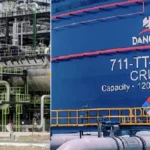Lagos Free Zone Company, the first free zone in Nigeria, with a fully integrated deep seaport, has completed the issuance of a NGN10.5 billion 20-year Series 1 Senior Guaranteed Fixed Rate Corporate Infrastructure Bond, due in 2041, it announced on Thursday.
The 20-year bond was issued under LFZC’s NGN50 billion Debt Issuance Programme, the company said in an emailed statement.
Backed by an irrevocable and unconditional guarantee from InfraCredit, LFZC Series 1 Bond is accorded a ‘AAA’ long-term credit rating by Agusto and Co. and GCR, reflecting the highest degree of creditworthiness for these bonds.
The Series 1 Bond, which was priced at 13.5% coupon rate, was oversubscribed by institutional investors, including eleven domestic pension funds, two insurance firms, banks and HNIs, the company said.
The transaction is the first 20-year, non-FGN Bond to be issued in the Nigerian debt capital market and the first Securities and Exchange Commission-approved Infrastructure Bond for the development of an industrial hub, the statement noted.
The Series 1 Bond priced at a modest premium to the comparable FGN Sovereign Bond, provides a unique opportunity for pension fund managers, life insurance firms and other institutional investors to match their long-term liabilities with low-risk, high yield assets.
FGN’s 10-year benchmark bond has a yield of about 12.06%, while the 20-year bond has 12.815%.
LFZC is the infrastructure development subsidiary of the Tolaram, the Singaporean conglomerate with more than 45 years’ of presence in Nigeria and business interests in consumer goods, infrastructure and fintech space.
The LFZ is being developed as the largest integrated port based economic zone in Nigeria and shall serve as the beacon of industrial development across Nigeria and West Africa.
Enterprises operating in the LFZ will benefit from various policy incentives underpinned by the legislative framework applicable for free zones in Nigeria. In line with its vision statement – “to be the preferred industrial hub in West Africa with world-class infrastructure”, the zone is equipped with a host of shared industrial infrastructure necessary for attracting investments from the leading trade partners of Nigeria.
Commenting on the transaction, the Chief Finance Officer of LFZC, Mr. Ashish Khemka, stated: “This is a milestone transaction for us at Lagos Free Zone Company and it is a testament to the capacity of the Nigerian debt market as a veritable source of domestic capital for infrastructural development in Nigeria.
“The response to this bond programme further strengthens our commitment to realize our vision and thereby enhance Nigeria’s competitive positioning with our continuous focus on Ease of Doing Business parameters.
“We are particularly excited by the confidence demonstrated by pension fund managers and other institutional investors at this debut issue and we appreciate the team at InfraCredit, StanbicIBTC Capital and other parties to the transaction for this novel structure, which helps to de-risk the transaction and aligns the interest of different stakeholders,” he added.
According to the CEO of InfraCredit, Chinua Azubike, “It has been exciting working with Lagos Free Zone Company on this landmark transaction. It further demonstrates our commitment towards inclusive access to long-term local currency finance for infrastructure development”.
Azubike said by with this transaction, LFZC has set a new benchmark in the Nigerian domestic debt capital market, as the first 20-Year Corporate Infrastructure Bond in Nigeria, elongating the corporate bond yield curve and reinforcing the prospect for Nigerian Corporates to raise long-term finance within the local market.
“The LFZC Bond validates the appetite of domestic pension funds and other institutional investors in financing viable long-term infrastructure assets. We would continue to partner with all relevant stakeholders in executing novel strategies towards unlocking domestic capital for infrastructure finance, in addition to creating quality asset classes for diversifying investment portfolios of local institutional investors,” he added.

 Join Daily Trust WhatsApp Community For Quick Access To News and Happenings Around You.
Join Daily Trust WhatsApp Community For Quick Access To News and Happenings Around You.


